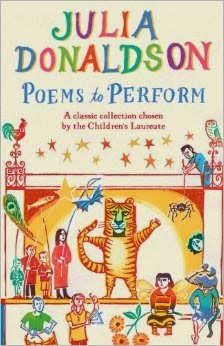Poetry Inspired By Mentor Poets- Structure & Patterns
In my eternal
quest for poetry mentor texts that will support the sometimes tentative writing
efforts of emerging student poets (and their teachers), I came across this poem
by John Rice. It was part of a collection ‘Poems to Perform: A Classic
Collection Chosen by the Children's Laureate,’ Julia Donaldson.
The poem has
a simple repetitive structure that provides a safe scaffold for the less
experience poet. Students immediately note the please do -please do not
pattern and the way the poet finishes with a line that breaks the pattern, yet
neatly ties the poet’s thoughts together. It’s as if he has an afterthought.
They also noted the element of humour the poet had injected into the poem. For
young poets, the presence of humour heightens engagement.
Instructions
For Giants
Please do not step on swings parks, youth
clubs, cinemas and discos
Please flatten all schools
Please do not eat children, pop stars, TV
soap operas, kind grannies who give us 50cents
Please feel free to gobble up dentists
Please do not block out the sunshine
Please push all rain over to France
Please do not drink the public swimming pool
Please eat all cabbage fields, vegetable plots and anything
green that grows in the countryside!
Please do not trample kittens, lambs or other baby animals
Please take spiders and snakes, ants and beetles home for your own pets
Please stand clear of the jets passing
Please sew up the ozone layer
Please mind where you put your BIG feet
And no sneaking off to China
John Rice
The next step
was to show students (in this case, Grade 4 students) how one can improvise
upon the structure of the original poem. I decided to write my poem focusing on
instructions I would give to a crocodile.
I certainly borrowed from the original structure but also added a few of
my own moves.
Instructions For Crocodiles
Please stay out of the swimming pool
Please don’t get snappy when things don’t go
your way
Please close your mouth when eating
Please consider becoming a vegetarian
Please stay away from my backyard
Only go after nasty folk
Please consider becoming a handbag
Please clean your teeth, swamp breath
And don’t be so thick-skinned about things
I have never, ever smiled at you
Seriously…
Alan j Wright
When I
presented the two poems I invited a comparison. I invited students to look for
similarities and differences. At this point I talked about writing in the style
of a trusted author, or writing under the influence of a fellow writer. We used
our poet’s eyes to note the craft moves being made within the poem.
As part of
the critical pre-writing phase of a lesson, I challenged students to brainstorm
a list of possible subjects to whom instructions could be given. They came up
with monsters, aliens (quite predictable) parents, teachers, siblings (their
word) pets (quite an array) and prime ministers.
Each young
poet then made a decision regarding the focus for ‘instructions.’ Following
this, I had them rehearse their words with a partner. I wanted them to hear the
words before they wrote. I then released them to write. They set about the
writing with enthusiasm and delight. I noticed how several of these young poets
were smiling as they wrote. It appeared they were entertained by their own
thoughts as they composed their pieces. At the conclusion of the workshop the
eagerness to share was also most notable. Their raw words were a delight. I
suggested that they revisit their poems the next day to view them with fresh
eyes and ears. I encouraged them to continue to polish their words and work
towards publishing and sharing their poems with a wider audience. My young
audience was nodding in agreement.
 |
| Rereading the raw words of our first drafts to hear them as a reader would hear them. This provides a perfect opportunity to begin polishing our poetic pearls. |
To conclude,
I have attached Tenaya’s poem. She informed me that she wanted to write her
instructions from the perspective of a boy with a younger sister. Her poem has
captured the structure of John Rice’s
poem as well as capturing the mindset of
the aggrieved older brother.
Instructions For Little Sisters
Note To All Little Sisters! Please do not torture me with your little pink frilly dresses Please don’t make me sit down and drink fake
tea and talk to stuffed animals on a plastic table and chairs in your room
Please colour in your own colouring book, not mine
Please don’t
sing to me, you make my ears bleed
Please dress the
dog up as a prince, instead of me
Please don’t
scream at me
Please don’t
show me your castle pictures
Please watch Ben
10 instead of The Little Princess
Please don’t
kill my pet worms
Please don’t
step on ants
And don’t cry in
front of me
Tenaya. F.






Comments
Post a Comment